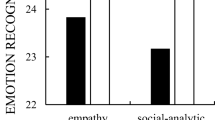Abstract
Previous research has shown that self-focused attention increases resistance to incorrect experimental suggestion about internal bodily states. The generality of this finding was tested in the present experiment for judgements which require more extensive external validation. It was found that false personality feedback was judged as significantly less accurate than genuine feedback under mirror selffocused conditions but not in the absence of a mirror. Explanations in terms of facial feedback, task involvement, social desirability, and self-serving reactions were discussed but these did not adequately account for the data. The results extend previous findings by showing that even where subjects do not have direct access to internal cues, private self-awareness enhances the validity of self-perceptions.
Similar content being viewed by others
References
Buss, A. H. (1980). Self-Consciousness and Social Anxiety. San Francisco: Freeman.
Carver, C.S. (1979). A cybernetic model of self-attention processes. Journal of Personality and Social Psychology, 37, 1251–1281.
Carver, C.S. de Scheier, M.F. (1978). Self-focusing effects of dispositional selfconsciousness, mirror presence, and audience presence. Journal of Personality and Social Psychology, 36, 324–332.
Cattell, R.B., Eber, H. W. & Tatsuoka, M.M. (1970). Handbook for the Sixteen Personality Factor Questlonnaire. Champaign, IL: IPAT.
Davis, D. & Brock, T.C. (1975). Use of first-person pronouns as a function of increased objective self-awareness and performance feedback. Journal of Experimental Social Psychology, 11, 381–388.
Duval, S. (1976). Conformity on a visual task as a function of personal novelty on attitudinal dimensions and being reminded of the object status of self. Journal of Experimental Social Psychology, 12, 87–98.
Duval, S. & Wicklund, R.A. (1972). A Theory of Objective Self-Awareness. New York: Academic Press.
Fenigstein, A., Scheier, M.F. & Buss, A.H. (1975). Public and private selfconsciousness: assessm ent and theory. Journal of Consul ting and Clinical Psychology, 43, 522–527.
Geller, V. &: Shaver, P. (1976). Cogniti ve consequences of self-awareness. Journal of Experimental Social Psychology, 12, 99–108.
Gibbons, F.X., Carver, C.S., Scheier, M.F. & Hormuth, S.E. (1979). Self-focused attention and the placebo effect: fooling some of the people some of the time. Journal of Experimental Social Psychology, 15, 263–274.
Greenwald, A.G. (1980). The totalitarian ego: fabrication and revision of personal history. American Psychologist, 35, 603–618.
Pryor, J.B., Gibbons, F.X., Wicklund, R.A., Fazio, R.H. &: Hood, R. (1977). Selffocused attention and self-report validity. Journal of Personality, 4–5, 513–527.
Schachter, S. & Singer, J. (1962). Cognitive, social, and physiological determinants of emotional state. Psychological Review, 69, 379–399.
Scheier, M.F. &: Carver, C.S. (1977). Self-focused attention and the experience of emotion: attraction, repulsion, elation, and depression. Journal of Personality and Social Psychology, 35, 625–636.
Scheier, M.F. & Carver, C.S. (1981). Private and public aspects of self. In L. Wheeler (ed.), Review of Personality and Social Psychology, Volume 2. London: Sage.
Scheier, M.F., Carver, C.S. & Gibbons, F.X. (1979). Self-directed attention, awareness of bodily states, and suggestibility. Journal of Personality and Social Psychology, 37, 1576–1588.
Snyder, C.R., Shenkel, R.J. & Lowery, C.R. (1977). Acceptance of personality interpretations: the ‘Barnum effect’ and beyond. Journal of Consulting and Clinical Psychology, 45, 104–114.
Wicklund, R.A. (1975). Objective self-awareness. In L. Berkowitz (ed.), Advances in Experimental Social Psychology, Volume 8. New York: Academic Press.
Wicklund, R.A. &: Duval, S. (1971). Opinion change and performance facilitation as a result of objective self-awareness. Journal of Experimental Social Psychology, 7, 319–342.
Author information
Authors and Affiliations
Rights and permissions
About this article
Cite this article
Davies, M.F. Self-focused attention and personality validation. Current Psychological Research 2, 87–93 (1982). https://doi.org/10.1007/BF03186748
Accepted:
Published:
Issue Date:
DOI: https://doi.org/10.1007/BF03186748




